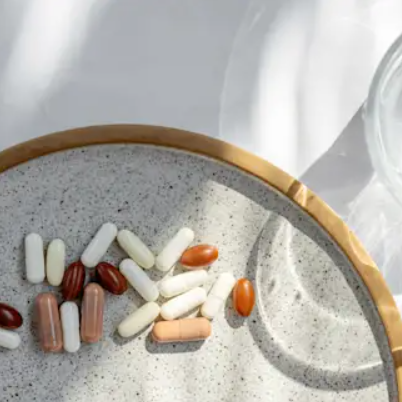When it comes to creating nutritional products for healthy aging, the key to success lies in focusing on a few critical areas rather than trying to cover everything. Instead of an all-encompassing approach, a targeted strategy can be much more effective, particularly for brands looking to cater to the aging population’s specific health needs.
It’s important to note that promoting supplements for healthy aging doesn’t have to be reserved for people in their 50s or 60s. In fact, younger consumers can benefit from preventive supplementation to support their long-term health and minimize the risk of certain conditions as they age.
Inside and Out: The Total Approach to Healthy Aging
While many consumers associate aging with external factors like wrinkles and sagging skin, internal health is just as important. Supplements that support both internal functions and external appearance can work together to help individuals age gracefully. For this reason, brands should consider not only skincare ingredients but also the broader nutritional needs that influence overall vitality.
Essential Ingredients for Healthy Aging
Here’s a breakdown of some vital ingredients that can support healthy aging, both internally and externally:
1. Calcium
As people age, calcium absorption tends to decrease, leading to a higher risk of brittle bones and osteoporosis. To address this, including calcium in supplements is crucial. Additionally, vitamins D and K can enhance calcium absorption, making them important partners in the supplement formulation.
2. Coenzyme Q10 (CoQ10)
CoQ10 is a naturally occurring antioxidant that helps with heart health, energy production, and managing age-related conditions such as Parkinson’s and diabetes. As CoQ10 levels naturally decline with age, supplementation can be beneficial. While it’s found in foods like meat and fish, these amounts aren’t usually sufficient to boost CoQ10 levels, making it an essential addition to supplements for healthy aging.
3. Magnesium
Magnesium is a key mineral that supports various functions, including muscle health, heart health, and calcium absorption. A deficiency in magnesium can increase the risk of diabetes, inflammation, and cardiovascular disease. Adding magnesium to healthy aging supplements is an effective way to ensure the body has the necessary support to function optimally.
4. Vitamins B6 and B12
As people age, cognitive decline, including memory loss and depression, can become more prevalent. Vitamins B6 and B12 play a crucial role in maintaining cognitive health and supporting bone density. Including these vitamins in supplements can help combat age-related cognitive issues.
5. Collagen
Collagen, a major protein found in the body, is vital for maintaining the strength and resilience of connective tissues like bones, skin, tendons, and cartilage. As we age, collagen production decreases, leading to wrinkles, joint discomfort, and weaker bones. A blend of multi-source collagen, sourced from beef, chicken, fish, and eggshell membrane, can provide a broad range of benefits, improving skin elasticity and joint health.
6. Hyaluronic Acid
This naturally occurring substance is found in joints, eyes, and skin, and is known for its ability to retain moisture. For healthy aging, hyaluronic acid offers benefits such as improved joint mobility, enhanced skin hydration, and faster wound healing. Including hyaluronic acid in supplements can promote overall skin health and flexibility.
7. Vitamin D
Vitamin D is crucial for bone health and calcium absorption, and it also supports other functions like immune health and anti-inflammatory processes. While sun exposure is a natural source, it’s not always reliable due to concerns about skin damage. Vitamin D supplementation has grown in popularity, and it’s becoming an essential part of the healthy aging supplement mix.
Expanding Healthy Aging Supplements Beyond the Older Demographic
While it’s important to target older consumers who are experiencing the effects of aging, there’s also a growing opportunity to market these supplements to younger demographics. As awareness around health and wellness continues to rise, particularly following the pandemic, many people are becoming proactive in maintaining their health at an earlier age. By focusing on prevention, brands can appeal to younger audiences (ages 18 to 30) who are looking to support their long-term health.
Marketing efforts can be tailored to make supplements more appealing to this younger audience, whether through fun, lifestyle-focused campaigns or by incorporating supplements into everyday routines, like recipes or cooking tips. This approach not only broadens the customer base but also promotes the importance of healthy aging from a younger age.
A Holistic Approach to Healthy Aging
Successful product development in the healthy aging market doesn’t just involve offering a range of ingredients—it requires a holistic approach that considers how supplementation fits into an overall lifestyle of health, including diet and exercise. Encouraging consumers to take care of their health at any age, rather than just focusing on symptoms as they get older, is essential for promoting long-term well-being.
Conclusion
The healthy aging space offers a wealth of opportunities for brands to create supplements that address both the external and internal aspects of aging. By targeting key nutrients like calcium, CoQ10, magnesium, collagen, and vitamins B6, B12, and D, brands can provide solutions that support bone health, cognitive function, skin health, and overall vitality. Moreover, by expanding the target audience to include younger consumers and promoting preventive health, brands can reach new markets and help individuals maintain their health as they age.

Leave a Comment